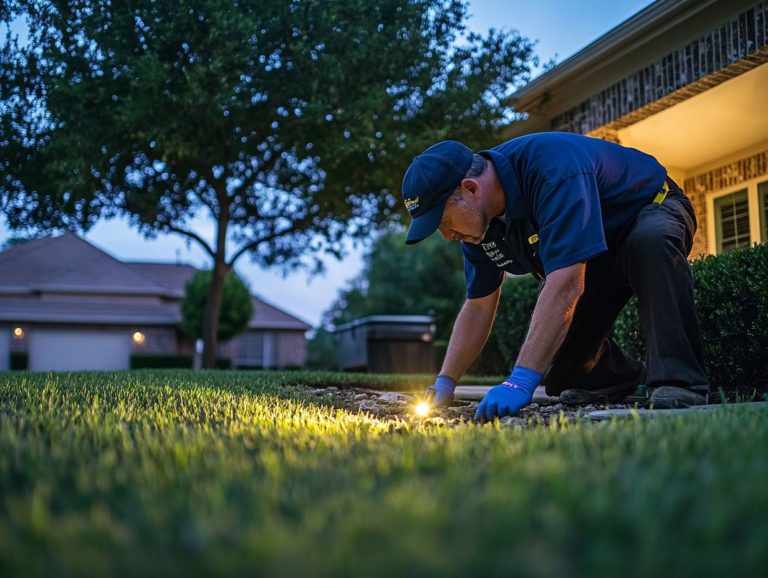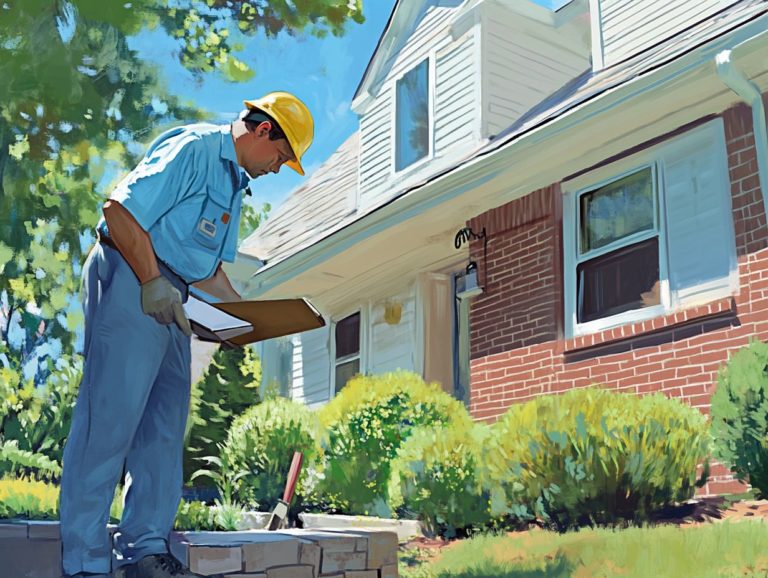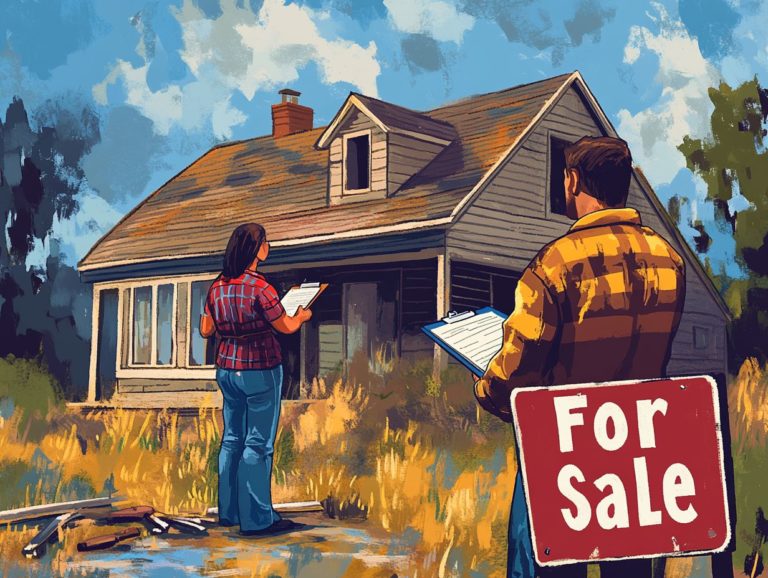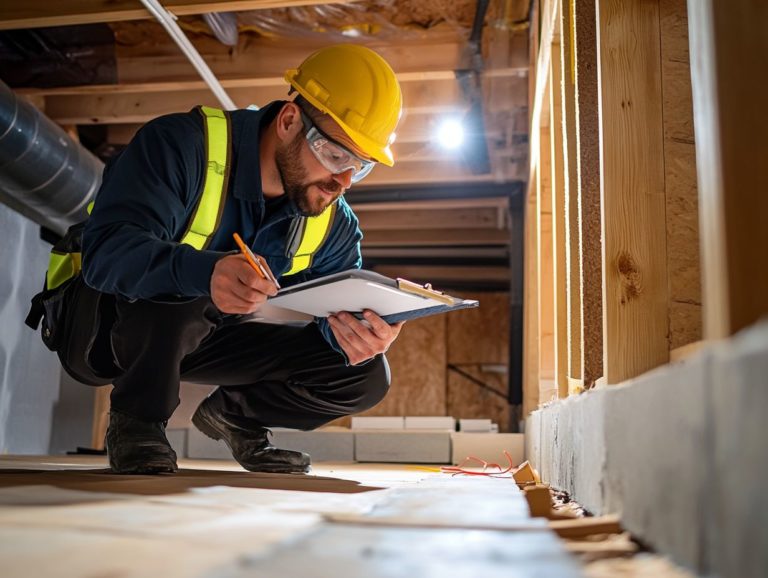How to Choose the Right Inspector for Your Home
When you’re navigating the world of buying or selling a home, a comprehensive inspection can be the game changer you didn’t know you needed.
Grasping the purpose of a home inspection is vital it reveals potential issues that could affect your investment significantly.
Selecting the right inspector is equally critical. By evaluating qualifications and spotting red flags, you can safeguard yourself from unnecessary time, expense, and headaches.
This guide will equip you with the essentials of home inspections, empowering you to make informed decisions at every turn.
Contents
- Key Takeaways:
- Why Home Inspections are Important
- Qualities to Look for in a Home Inspector
- Questions to Ask Before Hiring a Home Inspector
- Red Flags to Watch Out for When Choosing a Home Inspector
- How to Prepare for a Home Inspection
- Making the Final Decision
- Frequently Asked Questions
- What qualifications should I look for in a home inspector?
- How can I find a reputable home inspector?
- What should I ask a potential home inspector before hiring them?
- Is it necessary to attend the home inspection?
- Can I choose any home inspector or do I have to use the one recommended by my real estate agent?
- What happens if issues are found during the home inspection?
Key Takeaways:

Prioritize experience and certifications when choosing a home inspector.
Effective communication skills and attention to detail are essential qualities to look for in a home inspector.
Ask important questions and watch out for red flags when making the final decision on a home inspector, as well as considering how to choose the right real estate agent.
Why Home Inspections are Important
Home inspections are essential in the homebuying journey, offering you invaluable insights into the property’s condition before you commit to a significant investment.
A thorough inspection can reveal hidden issues think plumbing woes, electrical system failures, or structural concerns that might escape notice during a casual walk-through.
By hiring a certified inspector from reputable organizations like the American Society of Home Inspectors, you gain access to a detailed inspection report along with expert advice. This ensures you re well-protected against unforeseen repairs after the purchase.
Understanding the Purpose of a Home Inspection
The primary purpose of a home inspection is to give you a thorough understanding of a property’s condition, helping you identify any hidden issues that could impact your investment decisions.
By revealing critical elements like how strong the building is, electrical systems, and plumbing conditions, a comprehensive assessment provides you with the insights needed to negotiate effectively.
With this expert knowledge in hand, you can address necessary repairs or anticipate future maintenance costs that might affect both the purchase price and your overall budget.
Grasping these details not only aids you in making informed choices but also gives you the power to advocate for essential repairs or credits before sealing the deal. This ensures that your investment is both sound and secure.
Qualities to Look for in a Home Inspector
Selecting the right home inspector is crucial for ensuring a successful property inspection.
Their qualifications, experience, and commitment to ongoing training can profoundly impact the quality of the inspection you receive.
Making an informed choice here can lead to invaluable insights and peace of mind regarding your property investment.
Experience and Certifications
Experience and certifications hold immense value when you re selecting a home inspector. These credentials reflect a dedication to upholding rigorous inspection standards.
When you seek out a certified inspector, you re ensuring that the individual has the expertise and knowledge necessary to conduct a comprehensive evaluation of the property.
Organizations like the American Society of Home Inspectors play a vital role in this process. They establish stringent qualification criteria and provide continuous education opportunities.
This not only sharpens the inspectors’ skills but also enhances your confidence in the inspection process.
Choosing a certified inspector can change everything in spotting potential issues, safeguarding your property investment, and ensuring your peace of mind. For guidance, check out this article on how to find reliable home inspection services.
Attention to Detail and Thoroughness
Attention to detail and thoroughness are essential traits for an effective home inspector. This ensures that any hidden repairs or property condition issues are identified before they become costly surprises.
When you engage a home inspector, expect them to meticulously analyze every aspect of the property, from the foundation to the roof.
Utilizing advanced tools, they uncover concealed imperfections. Their comprehensive approach enables them to detect problems like water damage, electrical faults, or structural weaknesses that might otherwise slip under the radar.
By emphasizing a detail-oriented examination, inspectors shield you from unexpected repair costs and provide invaluable peace of mind about the property s overall integrity.
This diligence is crucial for making informed decisions and ultimately safeguarding your investment, reinforcing why thorough inspections are essential for any prospective homeowner.
Good Communication Skills

Good communication skills are vital for you as a home inspector. You need to share what you find and provide an insightful inspection report to your clients. This ability greatly shapes the overall experience for homeowners, ensuring they grasp the details of the property.
When you clearly articulate potential issues, it builds trust and empowers your clients with the knowledge necessary to make informed decisions. Engaging positively can also enhance customer reviews, as satisfied clients are more inclined to share their experiences online.
By offering valuable expert advice during discussions, you not only clarify the inspection report but also assist your clients in navigating the complexities of homeownership. This ultimately leads to better outcomes and fosters more confident homeowners.
Questions to Ask Before Hiring a Home Inspector
Make sure you’re asking the right questions before hiring a home inspector! Knowing how to spot a good home inspector boosts your peace of mind and helps ensure a thorough inspection.
What to Ask About the Inspection Process
Inquiring about the inspection process is essential, as it offers valuable insights into the thorough assessment the inspector will perform and the standards they follow.
You should seek clarity on various aspects, starting with how a detailed quote is generated that transparently breaks down all cost components. It s crucial for you to understand the specific parameters that will be evaluated, including structural integrity, electrical systems, plumbing, and more. Structural integrity refers to how well a building can support weight and resist forces.
Knowing what the inspector considers critical and how they categorize their findings ensures you are well-informed about potential issues, empowering you to make educated decisions. Understanding these inspection standards not only boosts your confidence but also equips you for possible negotiations based on the inspector’s comprehensive report.
What to Ask About the Inspector’s Background
Understanding the inspector’s background is vital, as their qualifications and certifications directly influence the quality of the inspection you receive.
An inspector with strong credentials not only demonstrates a command of industry standards but also bears the significant responsibility of identifying potential issues that could compromise property safety.
When you seek expert advice, it s essential to delve into customer reviews, as they can offer valuable insights into the inspector’s reliability and competence in prior inspections. Additionally, considering the inspector s experience with various property types can deepen the assessment s value.
By ensuring the inspector is well-qualified, you are effectively safeguarding your investment, placing your trust in someone who is both knowledgeable and reputable.
Red Flags to Watch Out for When Choosing a Home Inspector
Recognizing red flags when selecting a home inspector is essential for ensuring you don’t engage an unreliable professional who might miss critical property issues. To help you make a more informed choice, check out how to compare home inspection services. By being vigilant in your assessment, you safeguard your investment and ensure that no important details slip through the cracks.
Warning Signs of an Unreliable Inspector
Warning signs of an unreliable inspector include vague inspection reports, a lack of transparency in communication, and poor customer reviews that raise genuine concerns about their credibility. Communication should be open and clear, allowing you to ask questions without hesitation.
If past customers express dissatisfaction or share negative experiences, it’s vital to take those warnings seriously, as they may uncover underlying issues that aren t immediately visible. A good inspector welcomes feedback to improve their service.
Recognizing these red flags is crucial for safeguarding your investment and ensuring peace of mind in your home-buying journey. Don’t miss out on knowing what could go wrong!
How to Prepare for a Home Inspection

Thorough preparation for a home inspection elevates the overall experience and increases the likelihood of a favorable inspection report.
This proactive approach provides invaluable insights into the property’s condition, ensuring you are well-informed about its strengths and potential areas for improvement.
Steps to Take Before the Inspection
Taking specific steps before your home inspection can significantly influence the outcome. Ensure all property features are accessible and in top condition for a thorough evaluation.
- Identify and resolve any obvious issues, such as leaky faucets or damaged roofing, to minimize potential red flags during the inspection.
- Provide clear access to crawl spaces, attics, and basements. Inspectors need to examine these areas for structural integrity and hidden problems.
- Remove clutter and secure pets for a smoother inspection experience.
By implementing these measures, you increase the likelihood of a successful inspection, gain a clearer understanding of your property’s condition, and potentially boost its value.
What to Expect During the Inspection
During the home inspection, expect a comprehensive evaluation of the property. This assessment reveals various systems and potentially hidden issues that could affect the home’s value.
The inspector will meticulously scrutinize critical components such as the roof, plumbing, electrical systems, and foundation, documenting their findings with precision.
Expect clear communication throughout the process. The inspector focuses not just on identifying problems but also on providing expert advice tailored to your needs as a new homeowner.
This guidance helps you understand necessary repairs, routine maintenance, and potential upgrades, enabling you to make well-informed decisions as you move forward.
Making the Final Decision
When hiring a home inspector, thoughtful consideration of the inspection report is essential. This document offers valuable insights that significantly impact your negotiation process regarding potential repairs.
Factors to Consider When Choosing a Home Inspector
When selecting a home inspector, weigh the following factors:
- Experience: Evaluate their history in the field to understand their expertise with various property types.
- Customer Reviews: Explore previous reviews to assess the inspector’s reliability, communication skills, and attention to detail.
- Inspection Process: Assess the quality of expert advice shared during the inspection. This reveals how well the inspector addresses your concerns.
Taking these considerations into account empowers you to make a more informed and confident decision. Don’t wait! Choose your inspector wisely to ensure your future home is safe and sound.
Frequently Asked Questions
What qualifications should I look for in a home inspector?

When choosing a home inspector, look for someone who is licensed, insured, and certified. It’s also important to consider how to select a home inspector for your needs, ensuring they have experience in the field and knowledge of relevant building codes and regulations.
How can I find a reputable home inspector?
Start by asking for recommendations from friends, family, or real estate agents. You can also search for licensed and certified inspectors through professional organizations such as the American Society of Home Inspectors (ASHI) or the National Association of Home Inspectors (NAHI). Additionally, consider reading up on how to choose the right real estate agent for you to ensure you make an informed decision.
What should I ask a potential home inspector before hiring them?
Some questions to ask include:
- What are your qualifications and experience?
- What does your inspection process entail?
- Do you offer any additional services?
- Can you provide references?
- What are your availability and pricing?
Choosing the right home inspector is crucial for ensuring your future home is safe and sound. To make an informed decision, take your time and refer to this guide on how to choose the right inspector for your home and ask the right questions.
Is it necessary to attend the home inspection?
You should definitely attend the home inspection. This gives you a chance to ask questions and understand the condition of your potential home.
Can I choose any home inspector or do I have to use the one recommended by my real estate agent?
You can choose any home inspector you prefer. If your agent recommends someone, it’s important to do your research and learn how to find a qualified home inspector to ensure they are both qualified and fair.
What happens if issues are found during the home inspection?
If issues arise, you can talk to the seller about fixing them or ask for a repair credit. If the problems are serious, you might decide to walk away from the deal.






